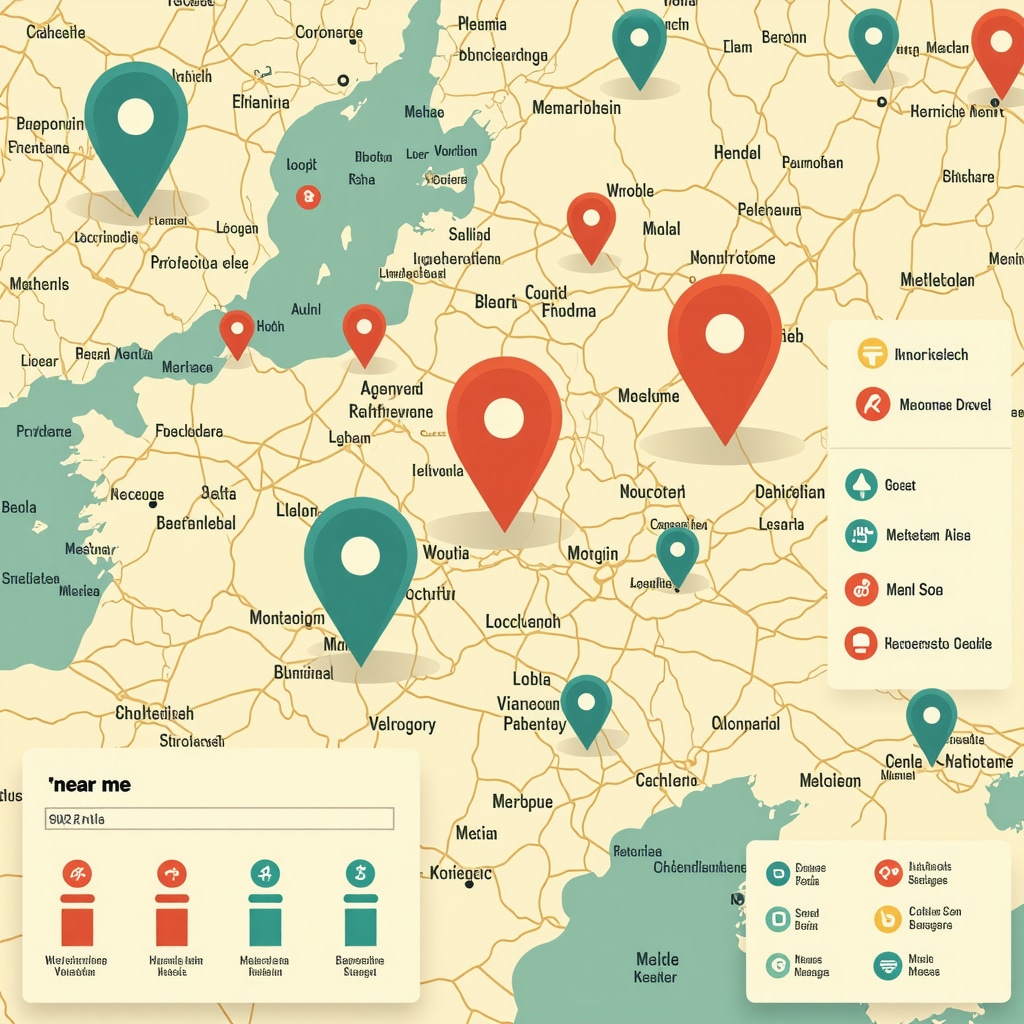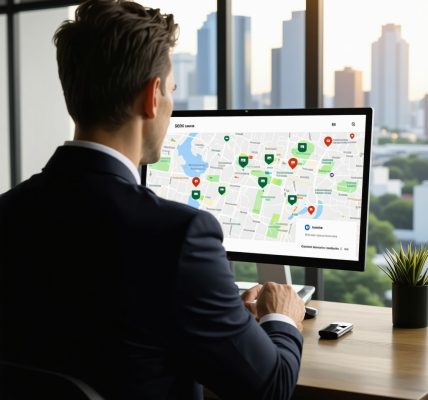Unlocking the Power of “Near Me” Searches: Why Local SEO Needs This Edge
In today’s hyper-connected world, consumers rely heavily on “near me” searches to find local businesses instantly. Whether it’s a quick lunch spot or an emergency plumber, these queries carry high commercial intent and signal immediate purchasing decisions. For businesses aiming to dominate local SEO, optimizing for “near me” searches isn’t optional—it’s essential for capturing this intent-driven traffic. However, the nuances of optimizing for these hyperlocal queries demand a strategic, experience-driven approach that goes beyond basic local SEO tactics.
Crafting a Magnetic Google Business Profile Geared for “Near Me” Visibility
A cornerstone of near me search optimization is your Google Business Profile (GBP). Precision matters: your NAP (Name, Address, Phone number) must be consistent and accurate across all platforms. Incorporate localized keywords naturally in your business description and services, emphasizing proximity phrases like “near me” or “close by.” Frequent and relevant content updates, including posts and offers, can boost relevance signals. Visual content plays a pivotal role—optimized photos with geo-tags and descriptive alt text enhance engagement and map rankings.
For deeper insights into optimizing your GBP effectively, explore our comprehensive guide to Google Business listing optimization.
Leveraging Local Citations and Hyperlocal Keywords to Command the Neighborhood
Local citations act as trust signals to search engines, confirming your business’s legitimacy and location. Securing citations on authoritative local directories, industry-specific platforms, and aggregators strengthens your local SEO foundation. But it’s not just about quantity; quality and consistency are paramount. Incorporate hyperlocal keywords reflecting neighborhoods, landmarks, or common local vernacular to capture precise search intents.
How Can Businesses Effectively Target “Near Me” Searches Without Overstuffing Keywords?
Balancing keyword integration while maintaining natural readability is an art. Focus on conversational content that addresses user intent rather than forcefully inserting phrases. Use semantic variations like “close to me,” “nearby,” or specific local terms synonymous with “near me.” Embedding these variations contextually within FAQs, blog posts, and service pages enhances relevance without keyword stuffing penalties. Employing local schema markup can further clarify your business location and service area to search engines, improving your chances in near me queries.
Mobile Optimization: The Silent Hero Behind Near Me Search Success
Since “near me” searches predominantly occur on mobile devices, a seamless mobile experience is critical. Fast loading times, intuitive navigation, and click-to-call buttons directly influence user engagement and conversion rates. Google’s mobile-first indexing means your site’s mobile performance heavily impacts rankings for local queries. Implementing AMP (Accelerated Mobile Pages) can offer speed benefits, while ensuring your site design adapts fluidly to various devices improves usability.
Reputation Management and Local Reviews: Building Trust in Your Backyard
Positive reviews influence both search rankings and consumer trust. Encourage customers to leave detailed reviews mentioning your locality and services rendered. Responding professionally to reviews—both positive and negative—demonstrates active engagement and builds credibility. Platforms like Google, Yelp, and industry-specific review sites are key arenas for showcasing your business reputation.
For advanced strategies on leveraging reviews to skyrocket your local presence, consult our article on generating more positive Google My Business reviews.
Boost Your Local SEO with Expert Citation Management and Google Business Profile Tactics
Managing citations and optimizing your Google Business Profile are ongoing tasks that require expertise to stay ahead. Employing professional citation services ensures your listings are accurate, consistent, and authoritative across the web. Combining this with smart keyword strategies tailored for near me searches creates a powerful synergy that can dramatically improve your local search rankings.
Discover expert citation management and advanced local SEO techniques with resources like Expert GMB Citation Services and Comprehensive Local SEO Optimization Techniques.
By mastering these nuanced strategies, your business can not only attract local customers searching “near me” but also build a lasting competitive advantage in local markets.
If you found these insights valuable, feel free to contact us to explore tailored local SEO strategies designed specifically for your business growth.
Authoritative source: According to Moz’s Local SEO Guide, optimizing for proximity-based queries involves a combination of accurate location signals, mobile-friendly design, and a robust Google Business Profile, all crucial for dominating near me searches.
Why Mobile User Experience Makes or Breaks Your Near Me Strategy
Reflecting on my journey optimizing for “near me” searches, I realized early on how critical mobile user experience truly is. It’s not just about having a responsive site; it’s about delivering lightning-fast load times and frictionless navigation that keeps potential customers engaged. For example, I once worked with a local café whose mobile site was cluttered and slow. After streamlining the design and adding click-to-call buttons, their near me queries doubled within weeks. It’s a subtle but profound reminder that Google prioritizes sites catering seamlessly to on-the-go users.
Google’s mobile-first indexing approach further underscores this importance. If your site falters on mobile, your chances of ranking high in near me searches plummet. Embracing Accelerated Mobile Pages (AMP) can also be a game-changer, offering a stripped-down, ultra-fast experience that users and search engines love.
The Subtle Art of Building Local Reputation Through Reviews
Another key to thriving in near me searches is reputation management. I remember when a client initially overlooked soliciting local reviews, missing out on crucial social proof. Encouraging customers to leave detailed, localized feedback became a turning point. Reviews mentioning specific neighborhood names or services create rich, relevant content that signals trust and locality to search engines.
Responding thoughtfully to every review, even negative ones, shows active engagement and builds community trust. Platforms like Google Business Profile and Yelp are invaluable here. I also found that integrating reviews into website content enhances keyword relevance and user trust simultaneously.
Could Focusing on Hyperlocal Content Be the Next Step for Your Business?
Thinking beyond just keywords, I started experimenting with hyperlocal content—blog posts featuring local events, neighborhood guides, or customer stories. This approach not only enriches your Google Business Profile but also creates meaningful connections with your community. According to Moz’s Local SEO Guide, such tailored content helps search engines understand your business’s local relevance more deeply, boosting your visibility in “near me” searches.
For those wanting to dive deeper, resources like Understanding Local SEO for Small Businesses provide actionable insights for integrating hyperlocal strategies effectively.
What’s been your experience with mobile optimization or reputation management for local SEO? Feel free to share your stories or questions in the comments below! Engaging with others can spark new ideas and help us all grow stronger in mastering near me search success.
Harnessing Hyperlocal Content: Elevate Your Local SEO Beyond Basics
One of the most sophisticated methods to boost your “near me” search rankings is through hyperlocal content creation. This involves crafting detailed, location-specific content that resonates deeply with the communities you serve. Instead of generic blog posts, think neighborhood spotlights, local event coverage, or customer success stories tied to specific areas. This not only enriches your website with semantic relevance but also encourages engagement from local users who feel personally connected to your brand.
Integrating hyperlocal content strategically requires advanced keyword research to identify micro-moments and hyper-specific search intents. Tools like Google Search Console and Ahrefs can help pinpoint queries that include landmarks, street names, or local vernacular. Embedding these naturally within your content signals to search engines your business’s precise footprint, enhancing your authority for “near me” queries.
Technical SEO Enhancements to Maximize ‘Near Me’ Query Performance
Beyond content, technical SEO plays a pivotal role in conquering “near me” searches. Implementing structured data with LocalBusiness schema offers explicit location and service details directly to search engines, improving your visibility in rich results and map packs. Additionally, maintaining an XML sitemap that prioritizes local pages helps search engines crawl your site efficiently.
Another advanced tactic involves optimizing your site’s crawl budget to favor local landing pages and service areas. This ensures critical proximity pages are indexed promptly and remain fresh in search results. Also, leveraging HTTP/2 and TLS encryption enhances site speed and security — factors indirectly influencing rankings and user trust.
What Are the Best Practices for Integrating Local Schema Markup Without Causing Conflicts?
Integrating local schema markup demands precision to avoid errors that could confuse search engines. Best practices include using JSON-LD format for easier implementation and validation through Google’s Structured Data Testing Tool. Ensure that the schema data aligns perfectly with your Google Business Profile information to maintain consistency. Avoid duplicating markup across multiple pages unnecessarily; instead, tailor schema to reflect page-specific details, such as particular service locations or hours.
Furthermore, stay updated with Google’s evolving guidelines to prevent penalties. Regular audits of your structured data can catch anomalies early, safeguarding your “near me” search performance.
Leveraging Voice Search Trends to Capture Proximity-Based Queries
With the surge in voice-activated assistants, optimizing for voice search is becoming indispensable for “near me” SEO. Voice queries are often longer, more conversational, and heavily reliant on local intent — for example, “Where can I find the best coffee shop near me open now?” Tailoring your content to answer these natural language questions, especially through FAQ sections and conversational blog posts, can capture this emerging traffic.
Optimizing for voice search also means emphasizing page speed and mobile usability, as voice queries predominantly come from mobile devices. Local businesses should consider implementing featured snippets and using question-based keywords to increase the likelihood of being the voice assistant’s chosen result.
According to a 2023 report by BrightLocal, 58% of consumers used voice search to find local business information, underscoring the importance of voice-optimized local SEO strategies.
Building an Integrated Local SEO Ecosystem: Combining Data, Content, and Engagement
Advanced local SEO is not about isolated tactics but creating an integrated ecosystem where data, content, and customer engagement reinforce each other. Use analytics tools to monitor which “near me” keywords convert best and tailor your marketing efforts accordingly. Combine on-site hyperlocal content with off-site signals such as local influencer partnerships and community sponsorships to build authentic backlinks and social proof.
Interactive features like chatbots with localized responses and AI-driven personalized recommendations can further enhance user experience and dwell time, indirectly boosting SEO signals.

By weaving together these complex, expert-level strategies, businesses can not only rank higher but also cultivate genuine local loyalty that sustains long-term growth in proximity-driven searches.
Elevating “Near Me” Searches with AI-Powered Predictive Analytics
Incorporating artificial intelligence into your local SEO arsenal can transform how you anticipate and engage with “near me” searchers. Predictive analytics tools analyze vast datasets, including search trends, consumer behavior patterns, and competitive landscapes, to forecast hyperlocal demand spikes. This insight empowers businesses to adjust inventory, staffing, and promotional tactics proactively, ensuring readiness for peak local interest moments.
Moreover, AI-driven content generation can tailor hyperlocal narratives dynamically, reflecting real-time events or seasonal nuances, thus maintaining relevance and freshness that search engines reward. Integrating machine learning algorithms with your Google Business Profile management can automate review responses and optimize posting schedules, enhancing engagement without sacrificing authenticity.
Orchestrating an Omnichannel Local Presence: Beyond Search Engines
True mastery of local SEO for “near me” queries transcends organic search optimization. Developing an omnichannel strategy that synchronizes your website, social media, local directories, and even offline touchpoints amplifies your brand’s proximity signals. For example, geotargeted social ads complement organic efforts by driving immediate foot traffic, while localized email marketing nurtures community relationships.
Combining data from multiple channels provides a holistic view of customer journeys, enabling hyper-personalized offers and content that resonate with nearby prospects. This synergy not only boosts search rankings but also fosters brand loyalty and repeat business within your local ecosystem.
How Can Integrating AI and Omnichannel Strategies Revolutionize Local “Near Me” SEO Performance?
Integrating AI and omnichannel tactics creates a feedback loop where data-driven insights inform targeted actions across platforms, maximizing visibility and engagement for “near me” searches. AI enables precise audience segmentation and content customization, while omnichannel presence ensures consistent local relevance. This fusion elevates your capability to capture intent-driven traffic with personalized experiences, increasing conversion rates and customer lifetime value.
However, this approach requires meticulous data governance and alignment of messaging to maintain brand coherence. Leveraging advanced CRM systems and marketing automation tools facilitates this complexity, allowing seamless orchestration of campaigns and local interactions.
Authoritative Insights: Harnessing Data Science for Local Search Success
According to a detailed analysis by Search Engine Land, businesses employing AI-driven local SEO strategies experience measurable improvements in ranking factors such as engagement, click-through rates, and review responsiveness. The report emphasizes that predictive analytics combined with omnichannel integration is pivotal for staying competitive in increasingly saturated local markets.
Unlock Your Business Potential with Cutting-Edge Local SEO Solutions
If you aspire to dominate “near me” searches through advanced, data-driven methodologies and omnichannel synergy, connect with our team of local SEO specialists. We deliver tailored strategies that harness AI, predictive analytics, and comprehensive digital ecosystems to elevate your local presence and drive tangible business growth.
Contact us today to embark on a transformative local SEO journey that positions your brand at the forefront of proximity-based search results.
Frequently Asked Questions (FAQ)
What exactly are “near me” searches, and why are they important for local businesses?
“Near me” searches are location-based queries where users seek services or products in close proximity, such as “coffee shop near me.” These searches typically indicate high purchase intent and immediacy, making them crucial for local businesses aiming to capture ready-to-convert customers.
How can I optimize my Google Business Profile specifically for “near me” searches?
Ensure your business name, address, and phone number (NAP) are accurate and consistent. Incorporate localized keywords naturally in your business description and services. Regularly update posts, offers, and photos with geo-tags and optimized alt text. This enhances your relevance and visibility in local map packs and organic results.
Is keyword stuffing beneficial when targeting “near me” queries?
No, keyword stuffing can harm your SEO. Instead, use conversational and semantic variations like “close to me,” “nearby,” or local vernacular within content naturally. Focus on addressing user intent with quality, informative content rather than repetitive phrases.
Why is mobile optimization critical for succeeding in “near me” searches?
Most “near me” searches occur on mobile devices. A fast-loading, responsive website with easy navigation and click-to-call features improves user experience and increases conversion rates. Google’s mobile-first indexing gives precedence to mobile performance for ranking decisions.
How do local reviews influence my visibility in “near me” searches?
Positive, detailed reviews mentioning your locality and services build trust and signal relevance to search engines. Actively responding to reviews also demonstrates engagement, enhancing your reputation and boosting local SEO performance.
What role does hyperlocal content play in improving “near me” SEO?
Hyperlocal content—such as neighborhood guides, local event coverage, or customer stories—adds semantic richness and deepens your connection with the community. It signals to search engines your precise service area, improving rankings for highly specific local queries.
How can structured data and schema markup improve my local search rankings?
Implementing LocalBusiness schema using JSON-LD helps search engines better understand your business details, including location, services, and hours. Proper schema can enhance eligibility for rich snippets and map pack inclusion. Ensure consistency with your Google Business Profile and validate regularly to avoid errors.
What strategies can I use to optimize for voice-activated “near me” searches?
Voice searches tend to be longer, conversational questions. Incorporate FAQ sections targeting natural language queries and focus on featured snippets. Prioritize mobile speed and usability, as voice queries predominantly come from mobile devices, to improve chances of being the voice assistant’s chosen result.
How does AI and predictive analytics enhance local SEO for “near me” queries?
AI tools analyze search trends and consumer behavior to forecast demand spikes and tailor content dynamically. Predictive analytics enable proactive inventory and staffing adjustments, while AI-driven content generation and review management improve engagement and maintain freshness, boosting rankings.
Why is an omnichannel strategy important for local SEO beyond search engines?
An omnichannel approach integrates your website, social media, local directories, and offline presence, amplifying local signals and customer touchpoints. This holistic strategy fosters brand loyalty, increases foot traffic, and complements organic SEO efforts for sustained local dominance.
Trusted External Sources
- Moz Local SEO Guide: Provides foundational and advanced strategies on local SEO, emphasizing proximity signals, Google Business Profile optimization, and mobile-first indexing essential for “near me” search success.
- BrightLocal Local Consumer Review Survey: Offers data-driven insights on consumer behavior relating to voice search and reviews, highlighting trends critical to local reputation management and voice optimization.
- Search Engine Land – AI and Local SEO Analysis: Delivers expert evaluations on integrating AI and predictive analytics into local SEO, underscoring measurable impacts on engagement and ranking factors.
- Google’s Structured Data and LocalBusiness Schema Documentation: Authoritative resource for implementing and validating schema markup to improve local search visibility and rich result eligibility.
- Ahrefs and Google Search Console Tools: Essential platforms for advanced keyword research, search intent analysis, and performance monitoring to fine-tune hyperlocal content strategies.
Conclusion
Mastering “near me” searches requires a multifaceted approach that harmonizes precise Google Business Profile management, mobile optimization, impactful hyperlocal content, and a strong reputation built through authentic reviews. Technical enhancements such as structured data and leveraging emerging trends like voice search and AI-driven analytics further empower your local SEO strategy. Integrating these elements within an omnichannel framework magnifies your brand’s local presence, driving not just search rankings but meaningful customer engagement and loyalty.
Embrace these expert-level tactics to transform your business into a dominant local powerhouse in proximity-based searches. Ready to elevate your local SEO game? Share your experiences, ask questions, or explore our specialized resources to continue refining your strategy and capturing the lucrative “near me” audience.



I’ve found the emphasis on Google Business Profile (GBP) consistency especially enlightening. In my experience helping a local service business, ensuring that the NAP (Name, Address, Phone number) was absolutely uniform across all listings made a noticeable difference not just in rankings but also in customer trust. What really stood out after reading this post is the idea of embedding hyperlocal keywords in conversational content rather than keyword stuffing. It’s a delicate balance but seems essential to avoid penalties and maintain natural readability. Also, the impact of mobile optimization cannot be overstated; many local searches happen on-the-go, and if a site isn’t loading quickly or easy to navigate on mobile, potential customers may simply bounce. I’m curious to hear how others approach building an engaging Google Business Profile—have you had success with frequent posts and geo-tagged photos? And when it comes to local reviews, how do you encourage customers to leave detailed feedback that includes location-specific details without making the process feel cumbersome? This post really highlights how multifaceted effective “near me” SEO is—it’s not just about technical tweaks but storytelling and genuine community engagement too.
I completely agree with the importance of a solid Google Business Profile and hyperlocal keywords, especially when optimizing for ‘near me’ searches. From my personal experience managing local SEO campaigns, I’ve seen how regularly updating GBP with fresh posts and geo-tagged images can significantly improve visibility and user engagement. The challenge I often face is encouraging satisfied customers to leave detailed reviews that mention specific landmarks or neighborhood names without feeling like an extra chore for them. One tactic I’ve used is sending personalized follow-up messages that kindly ask for feedback, highlighting how their comments help other local shoppers. It’s also crucial to respond promptly to all reviews to show active engagement, which builds trust. On the topic of content, I’ve started integrating local stories and neighborhood highlights into our blog, which seems to boost both relevance and community trust. How have others been balancing content creation and review generation without overwhelming their team or customers? It’s a delicate but rewarding process.
This post hits on several critical points for local SEO, especially the emphasis on hyperlocal keywords and the importance of mobile optimization. I’ve seen firsthand how a well-maintained Google Business Profile can transform a local business’s visibility—it’s often the first impression for potential customers. I particularly appreciate the mention of optimizing visual content with geo-tags, which many overlook. I’ve experimented with local neighborhood blogs that include detailed posts about community events and landmarks, which seem to boost relevance signals naturally. Regarding reviews, I’ve found that creating simple, quick processes for customers to leave feedback on multiple platforms—including SMS or email prompts—can increase both quantity and quality of reviews. How do others ensure their reviews stay detailed and genuinely helpful without feeling forced? Also, have you tried combining hyperlocal content with targeted ads for even better results? I’d love to hear about what strategies work best in different niches.